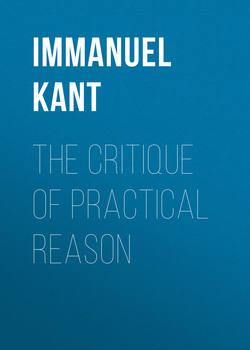The Critique of Practical Reason

Реклама. ООО «ЛитРес», ИНН: 7719571260.
Оглавление
Immanuel Kant. The Critique of Practical Reason
PREFACE
BOOK I. The Analytic of Pure Practical Reason
CHAPTER I. Of the Principles of Pure Practical Reason
I. DEFINITION
II. THEOREM I
III. THEOREM II
IV. THEOREM II
VII. FUNDAMENTAL LAW OF THE PURE PRACTICAL REASON
VIII. THEOREM IV
BOOK_1|CHAPTER_2. CHAPTER II. Of the Concept of an Object of Pure Practical Reason
BOOK_1|CHAPTER_3. CHAPTER III. Of the Motives of Pure Practical Reason
BOOK_2|CHAPTER_1. BOOK II. Dialectic of Pure Practical Reason
CHAPTER I. Of a Dialectic of Pure Practical Reason Generally
CHAPTER II. Of the Dialectic of Pure Reason in defining the
Отрывок из книги
{BOOK_1|CHAPTER_1 ^paragraph 5}
Practical principles are propositions which contain a general determination of the will, having under it several practical rules. They are subjective, or maxims, when the condition is regarded by the subject as valid only for his own will, but are objective, or practical laws, when the condition is recognized as objective, that is, valid for the will of every rational being.
.....
{BOOK_1|CHAPTER_1 ^paragraph 85}
In fact the sole principle of morality consists in the independence on all matter of the law (namely, a desired object), and in the determination of the elective will by the mere universal legislative form of which its maxim must be capable. Now this independence is freedom in the negative sense, and this self-legislation of the pure, and therefore practical, reason is freedom in the positive sense. Thus the moral law expresses nothing else than the autonomy of the pure practical reason; that is, freedom; and this is itself the formal condition of all maxims, and on this condition only can they agree with the supreme practical law. If therefore the matter of the volition, which can be nothing else than the object of a desire that is connected with the law, enters into the practical law, as the condition of its possibility, there results heteronomy of the elective will, namely, dependence on the physical law that we should follow some impulse or inclination. In that case the will does not give itself the law, but only the precept how rationally to follow pathological law; and the maxim which, in such a case, never contains the universally legislative form, not only produces no obligation, but is itself opposed to the principle of a pure practical reason and, therefore, also to the moral disposition, even though the resulting action may be conformable to the law.
.....